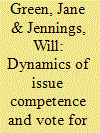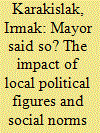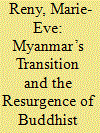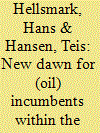|
|
|
Sort Order |
|
|
|
Items / Page
|
|
|
|
|
|
|
| Srl | Item |
| 1 |
ID:
113138


|
|
|
|
|
| Publication |
2012.
|
| Summary/Abstract |
This article develops the reward-punishment issue model of voting using a newly collated aggregate measure of issue competence in Britain between 1971 and 1997, revealing systematic differences between governing and opposition parties in the way citizens' evaluations of party competence are related to vote intention. Using monthly Gallup 'best party to handle the most important problem' and vote intention data, time series Granger-causation tests give support to a classic issue reward-punishment model for incumbents. However, for opposition parties this reward-punishment model does not hold: macro-issue competence evaluations are Granger-caused by changes in vote choice or governing party competence. An explanation is offered based upon the differentiating role of policy performance and informational asymmetries, and the implications are considered for comparative studies of voting, public opinion and for political party competition.
|
|
|
|
|
|
|
|
|
|
|
|
|
|
|
|
| 2 |
ID:
175910


|
|
|
|
|
| Summary/Abstract |
Amid rapid changes to energy systems around the world, there has been ongoing debate regarding incumbent actors' ability to respond to disruptive forces. This paper investigates the corporate strategies of the UK's large vertically integrated energy companies (the ‘Big Six’) between 2008 and 2016. Four of these companies are part of international groups, with parent companies in Germany, France and Spain. By analysing data from publicly available documents and a small number of key informant interviews with current and former decision-makers within Big Six companies and other stakeholders, this paper assesses their responses to three potentially disruptive changes to the UK's electricity sector: decarbonisation, decentralisation and digitalisation. Each of the Big Six have taken significant steps towards decarbonisation, with some progressing faster than others. Most have remained committed to centralised generation investments, and a couple have made early moves towards digital retail products and services but with limited impact thus far. The authors conclude that the UK's incumbent electricity firms have shown that they are able to adapt given strong policy incentives. Policy-makers should continue to set ambitious targets for the electricity sector, while taking into account the role of international parent companies in driving a broader strategy.
|
|
|
|
|
|
|
|
|
|
|
|
|
|
|
|
| 3 |
ID:
190641


|
|
|
|
|
| Summary/Abstract |
Wind energy plays an important role in the energy transition. However, many wind energy projects result in conflicts at the local level. Mayors and local council members are key actors who can play a supportive, moderating, escalating, or mediating role in siting decisions about wind energy. Further, communities' social norms encapsulate their beliefs about what a wind energy project should be like. Alongside public expectations, these norms indicate the layers of cultural dynamics and standards of communities. Hence, this study investigates the dynamics of local responses to wind energy projects and their outcomes. This is achieved through an empirical-qualitative approach in which the experiences of four Bavarian case studies in Germany are illustrated using document analysis and in-depth interviews. The results of this study indicate that mayors play a crucial role in local responses to wind energy projects in Bavaria. Their support is necessary but not sufficient for local acceptance. Other stakeholders, next to project characteristics and communication, as well as external events, also have an impact on local responses over time. The paper concludes with lessons learned about communication and information strategies, as the study has implications for policymakers and practitioners in relation to designing and planning wind energy projects.
|
|
|
|
|
|
|
|
|
|
|
|
|
|
|
|
| 4 |
ID:
176135


|
|
|
|
|
| Summary/Abstract |
Myanmar began a transition in 2011 that ended almost 50 years of military rule. During the transition, a nationalist movement called for protecting Buddhism from an “Islamic threat.” Anti-Islam nationalism was not new in Burmese history, yet the timing of its resurgence deserves attention. I argue that the incumbents’ anticipated electoral weakness in transitional elections was the primary reason for its resurgence. The incumbents sought to maximize societal support, and they faced a strong contender, the National League for Democracy, whose probability of winning was high. Social opposition was also significant by the time military rule ended. In a campaign to pass reforms to better “protect” Buddhism, the incumbents used monks to cast doubt on the NLD’s ability to represent Buddhist interests and to recruit former regime opponents who were nationalists. The incumbents garnered wide support for the reforms, yet it was insufficient for an electoral victory.
|
|
|
|
|
|
|
|
|
|
|
|
|
|
|
|
| 5 |
ID:
175018


|
|
|
|
|
| Summary/Abstract |
This paper develops a more detailed understanding of when incumbent actors may become the main locomotive driving energy transitions. It also illustrates the trade-offs between policy approaches that actively seek to involve the incumbents in transitions, and policy approaches that pursue transitions without their active involvement. The paper examines state support for the bioeconomy in Sweden and concludes that public investments have been geared towards large-scale, complex and integrated biorefineries that are dependent on the active participation of the forest industry. Incumbents in the forest industry have, however, both lacked motivation and the abilities required to take the necessary steps for commercialisation of the demonstrated concepts. Instead, a rather small investment in a joint venture between actors from the forestry and oil refinery industry in Sweden has spurred learning and revenues; and it has placed an oil refinery at the centre of the future development of what we here term distributed biorefining. The main trade-off is that while this shift has opened up for cross-industrial collaborations and the production of advanced biofuels and materials, it has also paved the way for further investments in existing fossil-fuel infrastructure.
|
|
|
|
|
|
|
|
|
|
|
|
|
|
|
|
|
|
|
|
|